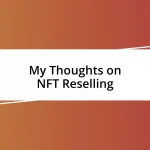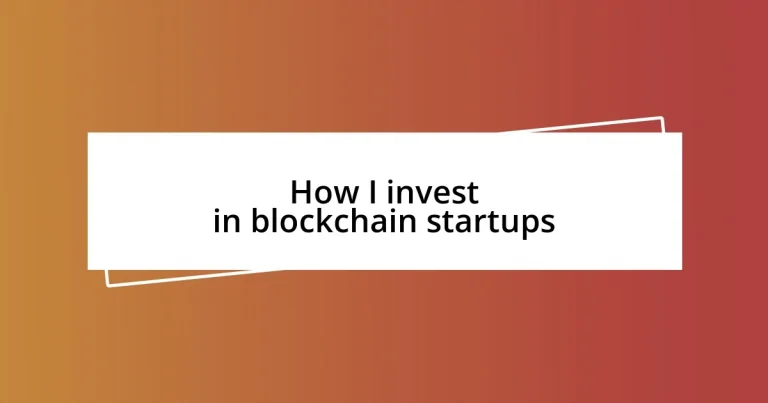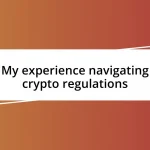Key takeaways:
- Blockchain startups can disrupt traditional industries and require adaptable business models for success.
- Team dynamics and expertise play a crucial role in a startup’s potential; the right mix of skills can drive innovations forward.
- Effective risk management and diversification in investment strategies are essential to navigating the volatile blockchain landscape.
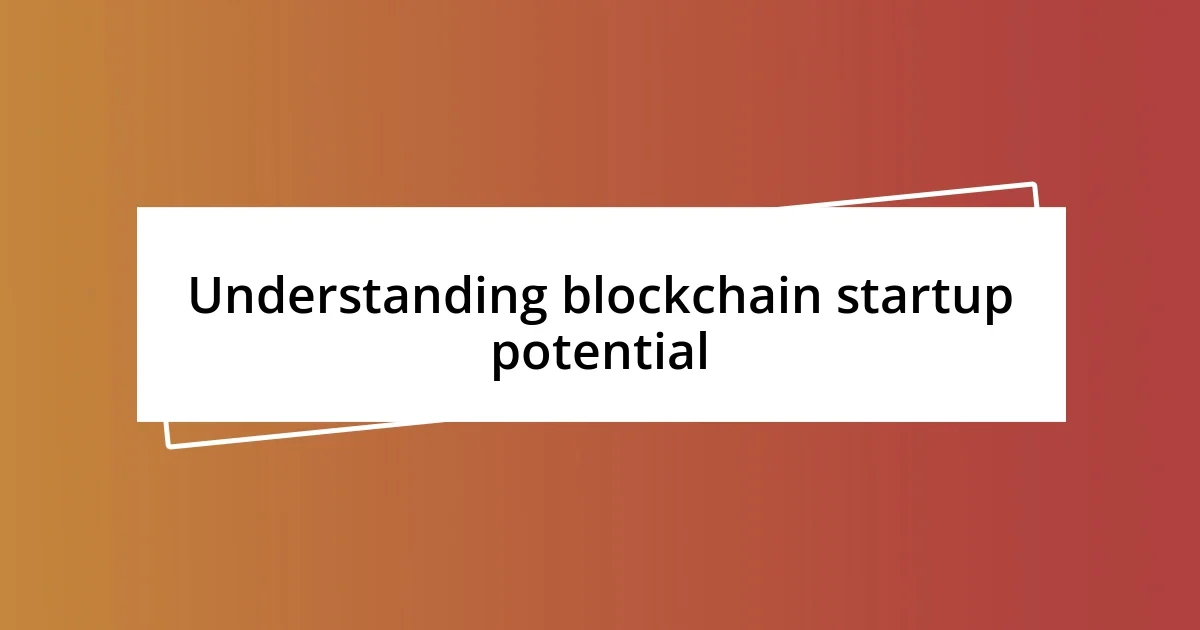
Understanding blockchain startup potential
When I first started exploring blockchain startups, I was struck by their unique ability to disrupt traditional industries. I remember chatting with a founder of a decentralized finance (DeFi) platform and realizing the transformative potential of smart contracts. Have you ever thought about how these technologies can redefine the concept of trust in transactions? It’s not just about financial gain; it’s about creating systems that empower individuals.
Another key aspect that really drew me to these startups is their inherent adaptability. I once invested in a blockchain project that was initially focused on supply chain solutions but shifted to healthcare during a critical moment. This pivot highlighted a startup’s flexibility to seize opportunities in real-time, which is crucial in today’s fast-paced environment. I often wonder, how many industries can be completely revolutionized by innovative thinking like that?
Understanding blockchain startup potential also involves recognizing the importance of team dynamics. I’ve seen firsthand how a passionate and skilled team can be a game-changer. While researching one startup, I found that the blend of tech expertise and industry experience in their leadership laid a solid foundation for success. Could the right team be the deciding factor for the next big blockchain breakthrough? I’d say absolutely!
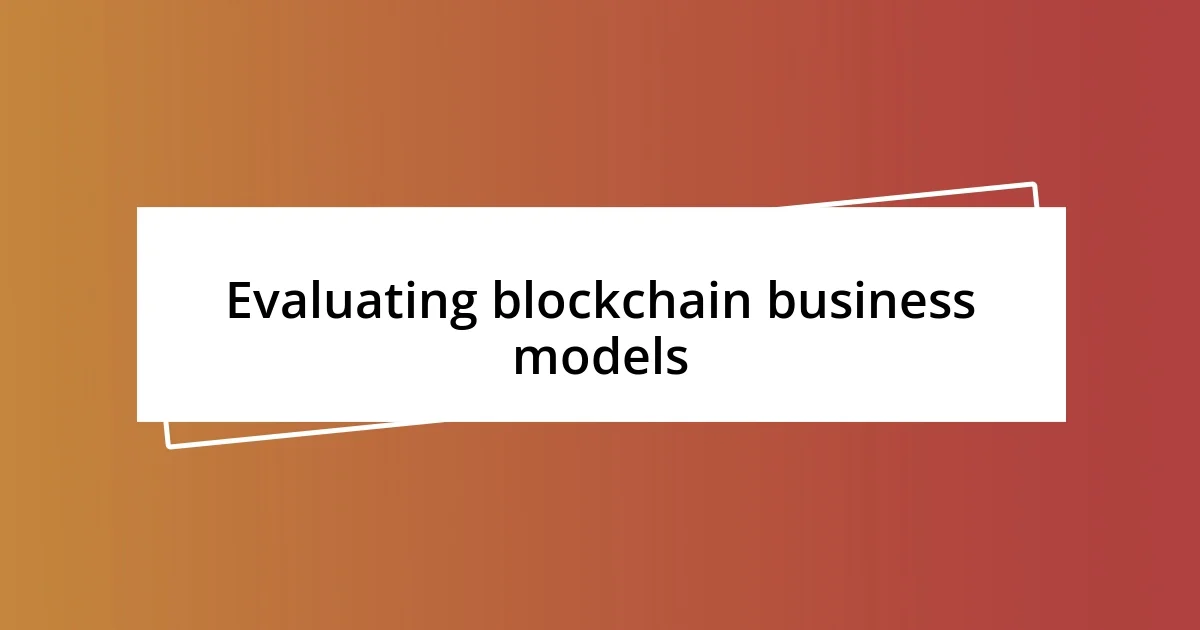
Evaluating blockchain business models
Evaluating blockchain business models requires a fine-tuned understanding of their underlying mechanics. For instance, I recall diving into a startup that aimed to leverage blockchain for identity verification. Initially, I was skeptical, thinking it might just be another tech gimmick. But after engaging with their model, I realized they were solving a pervasive problem—trust in digital identities. Have you considered how critical identity management can be in the age of data breaches?
The scalability of a business model is another vital consideration. I remember reviewing a blockchain project designed for microtransactions. While it sounded intriguing, upon further analysis, the team struggled to outline how they would expand beyond their initial niche. It made me reflect on the importance of a growth trajectory—without it, even the most innovative ideas can stall. What does scalability mean for blockchain startups? It signifies their capacity to evolve and handle increased user demands without compromising performance.
Finally, competition analysis can’t be overlooked in assessing blockchain business models. I once observed a startup with a promising peer-to-peer lending platform, but their unique value proposition felt diluted when I discovered similar offerings already in the market. This experience reminded me that in a saturated landscape, clear differentiation is essential for success. So, how does a startup ensure they stand out? By consistently innovating and refining their approach based on market feedback and trends.
| Business Model Type | Strengths |
|---|---|
| Decentralized Finance (DeFi) | Disrupts traditional finance, offers transparency and liquidity |
| Supply Chain Tracking | Enhances traceability, reduces fraud, and increases efficiency |
| Identity Verification | Addresses security and trust issues in digital interactions |
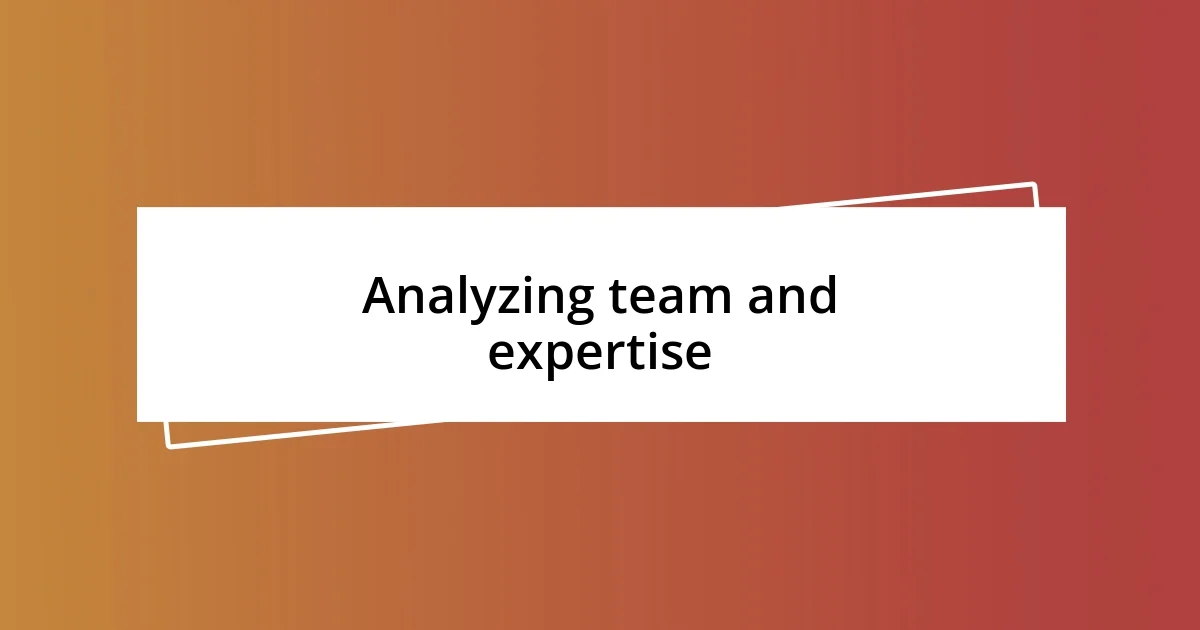
Analyzing team and expertise
When I invest in blockchain startups, assessing the team’s expertise is like looking under the hood of a car before a road trip. I’ve encountered situations where a team teetered on the edge of greatness but lacked crucial experiential balance. Take, for instance, a startup I considered that boasted a young, enthusiastic team with impressive technical skills. However, during my discussions, it became evident that they lacked industry veterans who could guide them through the nuances of regulatory challenges. It left me thinking: how much does seasoned experience weigh against passion in the startup ecosystem?
Here are some factors I keep in mind when analyzing a team’s expertise:
- Technical Knowledge: Does the team have strong blockchain developers with a proven track record?
- Industry Experience: Have they navigated the complexities of the market they are targeting?
- Diversity of Skills: Is the team well-rounded with experts in areas like marketing, business development, and compliance?
- Previous Success: Have any team members been part of successful startups before?
- Commitment: Can I sense their passion and dedication to the project through my interactions?
I’ve found that every interaction reveals layers of the team’s dynamics. There was a time when I attended a pitch meeting where the team’s synergy was almost palpable. Their collective vision and collaborative energy made me feel hopeful about their project’s potential. It reminded me of how critical it is not just to assess skills but to gauge the collective spirit driving a blockchain startup forward. Wouldn’t you agree that the right mix of talent can turn a promising idea into a success story?

Assessing market competition and trends
When I assess market competition and trends, I often find myself diving deep into the landscape like a detective piecing together a puzzle. I vividly remember analyzing a promising blockchain startup in the healthcare sector. They had a compelling use case, but as I scrutinized their competitors, I realized that several established players were already entrenched, offering similar solutions with more traction. In a crowded space, I often ask myself: what unique angle can this new player offer to rise above the noise?
Understanding trends is equally crucial. For instance, I once invested my time exploring a startup that aimed to capitalize on the growing interest in decentralized applications, or dApps. I was fascinated by their potential, but as I interviewed users and developers, it became clear that while enthusiasm is high, actual adoption is still shaky. Have you ever watched a trend unfold but questioned its sustainability? That moment of realization pushed me to drill down into user behavior—because a trend without substance is just a fleeting spark.
I also keep a close eye on regulatory developments. A while ago, I was intrigued by a blockchain startup focusing on cross-border payments. Initially, I was mostly excited about their technology, but then I learned about the impending changes to compliance laws that could disrupt their model. It prompted me to think: how can they adapt? I’ve learned that staying ahead of the regulatory curve is essential, as it can significantly influence the viability of any blockchain venture. By anticipating shifts, I position myself to make smarter investment choices.
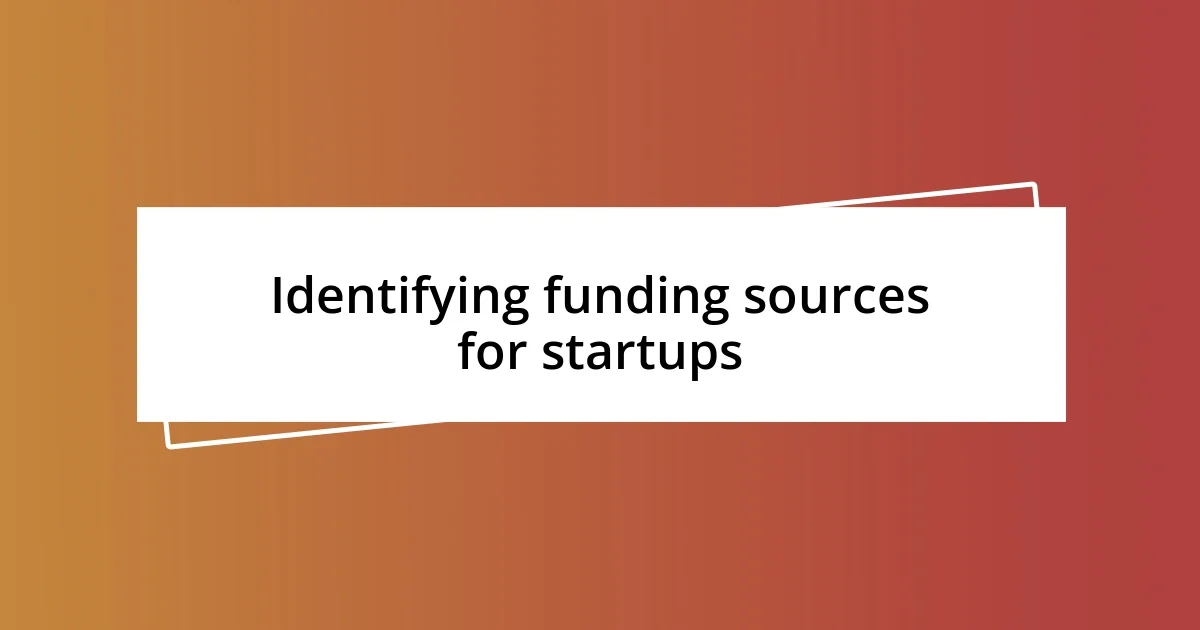
Identifying funding sources for startups
Identifying funding sources for startups is a nuanced process that I’ve come to appreciate over time. On one occasion, I was evaluating a promising blockchain venture, and they mentioned potential investment from angel investors. I found myself wondering: how do you build a network that attracts these investors? I realized that nurturing relationships within the investment community is vital. It’s not just about who you know, but how you present your vision and the problem your startup solves.
I’ve also had the chance to explore crowdfunding platforms, which are becoming increasingly popular for innovative startups. I remember one startup that successfully completed a crowdfunding campaign by harnessing the power of community. They didn’t just ask for funds; they engaged their potential investors, creating a community of supporters. This approach resonated with me: it’s about creating a shared belief in what you’re building. If you can make your investors feel a part of your journey, you’re more likely to gain their trust and financial backing.
Lastly, traditional venture capital remains a significant source of funding, but not every startup fits the mold. I once discussed with a team that sought venture capital but struggled during their pitches. They emphasized technology without fully articulating their market fit. Here’s what I learned: it’s crucial to align your funding source with your business model. Are you ready for rapid scaling, or is a more gradual, bootstrapped approach your style? Understanding the kind of funding that best suits your startup will guide your approach and lead to more fruitful connections.
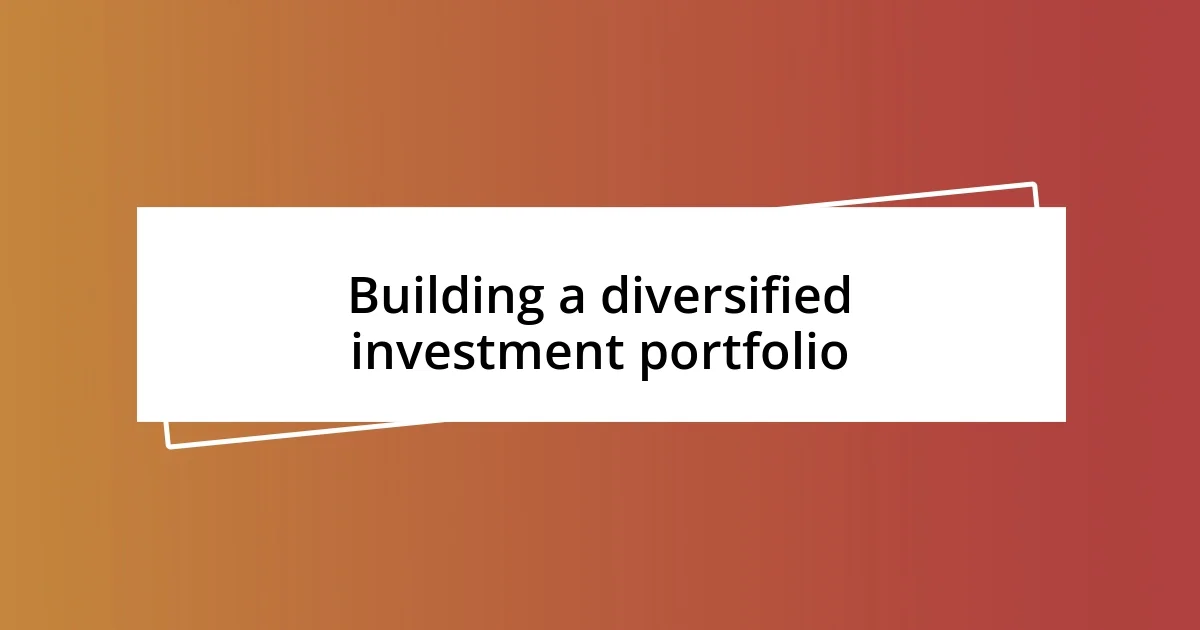
Building a diversified investment portfolio
When it comes to building a diversified investment portfolio in blockchain startups, I often draw parallels to creating a well-balanced meal. For example, I’ve made the mistake of concentrating too heavily on a single flavor—investing solely in one category, like fintech. This approach left me vulnerable when that segment faced regulatory challenges. I quickly learned that just as variety enhances a meal, a blend of sectors, such as healthcare, supply chain, and energy, cushions my portfolio against market fluctuations.
Another lesson I cherish revolves around risk management. Early in my investing journey, I went all-in on a single promising startup touted for its groundbreaking technology. It fizzled out, and I felt that sting of loss. Since then, I’ve adopted the 80/20 rule: 80% of my investments in established or less volatile projects and 20% in high-risk, high-reward startups. This strategy has allowed me to feel more secure while still exploring tantalizing opportunities. Isn’t it freeing to think that a well-rounded approach can lead to steadier growth and more peace of mind?
I can’t stress enough the importance of ongoing education in this space. I make it a point to regularly engage with blockchain communities and forums. Just last month, I participated in a discussion about emerging trends, and a fellow investor shared insights on a startup working on sustainable energy solutions via blockchain. That conversation sparked my interest and reminded me that staying curious helps me discover hidden gems. How often do you take the time to learn beyond your immediate interests? Diversification is not just about spreading risk; it’s about embracing new possibilities that can elevate your overall investment game.
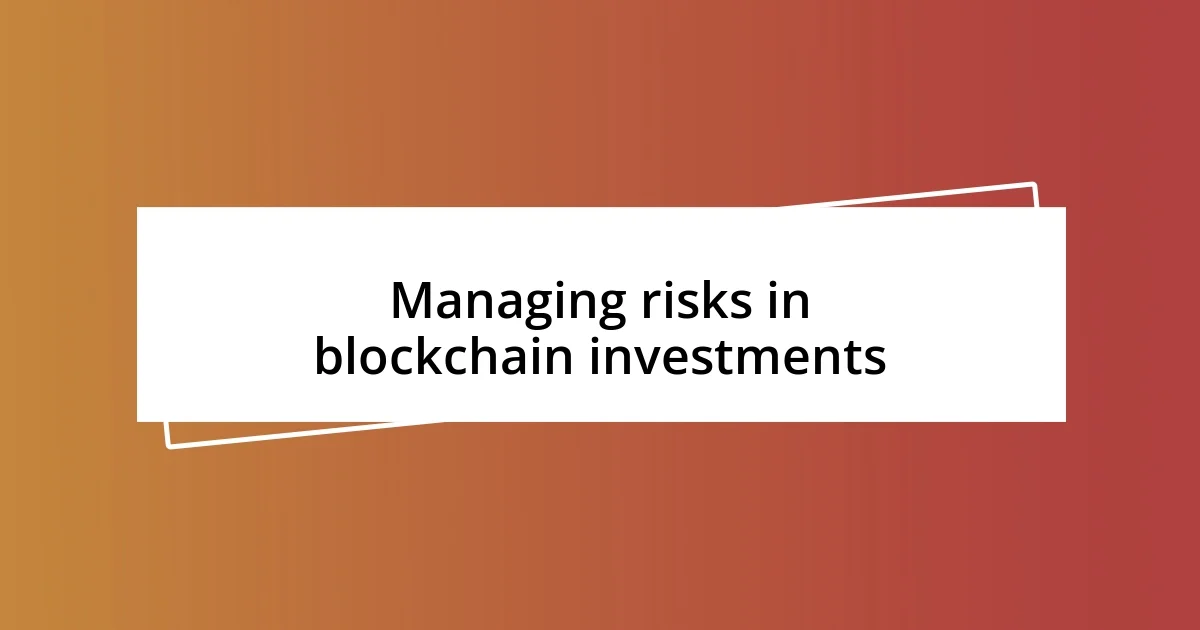
Managing risks in blockchain investments
The world of blockchain investments is full of potential and pitfalls, and managing risks is crucial to my strategy. I vividly recall a project that caught my eye, boasting a groundbreaking solution. However, after digging deeper, I uncovered issues with transparency and a lack of community engagement. It was a pivotal moment for me: it reinforced that due diligence is my greatest ally. What’s the point of chasing the next big thing if it jeopardizes my investment?
Setting clear boundaries around my investment amounts has also made a significant impact. I once got swept up in the excitement of a token launch and invested more than I had planned. When the token’s value plummeted shortly after, I felt a mix of panic and regret. Now, I ensure that my financial commitments align with my risk appetite. A simple rule I follow is to never invest more than I can afford to lose. How liberating is it to invest with a safety net in place?
Additionally, I’ve learned the value of leveraging expert networks. Early in my journey, I struggled with certain technical aspects of blockchain, which made me uneasy about my investments. So, I began engaging more with experienced investors and tech experts in online forums. Sharing my insights and questions helped me build a knowledge base and gain perspective. I found that, rather than going solo, collaboration can significantly reduce risk. Have you ever considered how surrounding yourself with knowledgeable peers can provide reassurance in uncertain waters?








